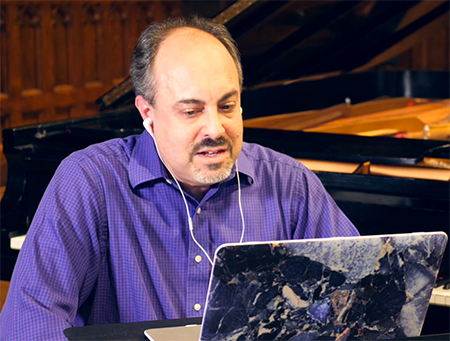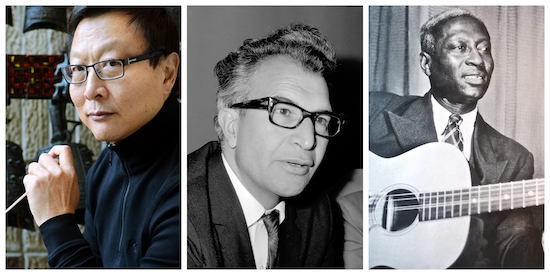by Jarrett Hoffman
HAPPENING TODAY:
From 2 to 4, Eric Charnofsky (above) hosts “Not Your Grandmother’s Classical Music,” which you can hear on WRUW or via stream. This week’s edition pays tribute to a late great icon of American musical theater. Hint: first name Stephen.
The broadcast includes selections from Symphonic Sondheim (performed by the London Symphony Orchestra) and from Liaisons – Reimagining Sondheim (featuring pianist Anthony de Mare in music by Nico Muhly, Steve Reich, Frederic Rzewski, Ethan Iverson, and Mark-Anthony Turnage).
Also on the broadcast: works by Beethoven, Frank Bridge, Augusta Read Thomas, and Camille Saint-Saëns — some of those pieces appearing in the form of interesting arrangements and transcriptions.
And at 7:30 pm, Matthew C. Saunders leads the Lakeland Civic Orchestra in Georges Bizet’s Carmen Suite No. 2, Florence Price’s Adoration, Tchaikovsky’s The Nutcracker Suite, and some seasonal favorites at Painesville United Methodist Church (freewill offering).
LOOKING AHEAD:
Two things new, one thing changed.
No Exit has announced its free Winter Concert Series, which features works by Amelia Kaplan, Mathew Rosenblum, Douglas Knehans, Cindy Cox, Pamela Madsen, and Constantin Koukias — all part of a consortium of composers known as The Collective. Performances take place on Friday, December 10 at 7:30 pm at Kent State’s Ludwig Hall, Saturday the 11th at 8:00 pm at the Bop Stop, and Saturday the 18th at 8:00 pm at Praxis Fiber Workshop.
Curious about The Collective? Read Laura King’s interview with founder Douglas Knehans. For more information, visit No Exit’s website or Facebook page. (Masks are required. Note that individual venues may have their own COVID-19 safety policies.)
The Cleveland Classical Guitar Society will host a free virtual concert on Saturday, December 11 at 7:30 pm. The program, “Mostly Movies,” features guitarist Mak Grgic in, well, mostly movie music, plus a holiday set and music of his native Balkans.
You’ll hear works by J.S. Bach, Ennio Morricone, Leonard Bernstein, Stanley Myers, Enrique Granados, and Miroslav Tadić. Or if you want to go by films, music from The Spy Who Loved Me (1977), Se7en (1995), The Mission (1986), The Good, the Bad, and the Ugly (1966), West Side Story (1961), The Deer Hunter (1978), and Kika (1993). Movie night(s) beforehand?
See the full program here, and RSVP here for the concert and a reception. The program will also be available afterwards on-demand.
And there have been updates to the time, location, and program of the Blue Streak Ensemble’s collaboration with Burning River Baroque. It will now take place on Wednesday, December 15 at 7:30 pm at St. Paul’s Episcopal Church. (Masks are required.)
Titled “Cycles of Creation and Annihilation,” the free program combines Baroque music (by J.S. Bach and Élisabeth Jacquet de la Guerre) with works by living female composers (Margaret Brouwer and Dolores White). Taking that mixture to another level is the Bach — a Two-Part Invention arranged by Brouwer for Blue Streak.
TODAY’S ALMANAC:
Chinese-born American composer Bright Sheng turns 66 today. Sheng is known for incorporating elements of Eastern and Western music into his compositions. Along those lines, he’s named Béla Bartók among his greatest influences, given that composer’s imitation of folk melodies, and his harnessing of the flavor of folk music rather than necessarily its style.
Sheng’s works have twice been named first runner-up for the Pulitzer Prize — listen to one of those pieces, the orchestral work H’un (Lacerations), here in a recording by Gerard Schwarz and the Seattle Symphony.
Sharing that birthday is American composer and jazz pianist Dave Brubeck (1920-2012). Perhaps the most fitting way for us to honor that figure is by listening to Jazz at Oberlin, a live album by the Dave Brubeck Quartet recorded in Oberlin’s Finney Chapel in 1953. (Click here for a playlist of the album on YouTube.)
Not only considered among the best of Brubeck and among the best albums of the decade, it was also highly influential on the presentation of jazz — and on the prospect of official jazz studies at Oberlin, something that wasn’t at all in the picture in the ‘50s.
Wendell Logan, who in 1973 launched the College’s jazz department, described that Finney Chapel concert as “the watershed event that signaled the change of performance space for jazz from the nightclub to the concert hall.” (Read more about the history of the school’s jazz department here.)
Tracing backwards from jazz to blues, we come to American singer, songwriter, and twelve-string guitarist Huddie William Ledbetter, best known by the stage name Lead Belly, who died on this date in 1949. Both his own songs and his recordings of folk standards have been highly influential, and his 1940 sessions with RCA Victor resulted in the album The Midnight Special and Other Southern Prison Songs, considered a milestone in African American folk music. He was inducted into the Rock and Roll Hall of Fame in 1988.
Enjoy in particular his vibrant, expressive tenor and his improvisational bits of speech here in one of his most popular recordings: the folk song “Where Did You Sleep Last Night.”






